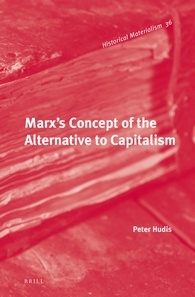Peter Hudis, Oakton Community College and Loyola University
In contrast to the traditional view that Marx’s work is restricted to a critique of capitalism and does not contain a detailed or coherent conception of its alternative, this book shows, through an analysis of his published and unpublished writings, that Marx was committed to a specific concept of a post-capitalist society that informed his critique of value production, alienated labor and capitalist accumulation. Instead of focusing on the present with only a passing reference to the future, Marx’s emphasis on capitalism’s tendency towards dissolution is rooted in a specific conception of what should replace it. In critically re-examining that conception, this book addresses the quest for an alternative to capitalism that has taken on increased importance today.
Biographical note
Readership
Reviews
Dan Swain, Marx & Philosophy. Review of books, December 1, 2012
Table of contents
Introduction: Why Explore Marx’s Concept of the Transcendence of Value Production? Why Now?
The object and purpose of this study
Objectivist and subjectivist approaches to Marx’s philosophical contribution
1. The Transcendence of Alienation in the Writings of the Young Marx
Marx’s beginnings, 1837–41
Marx’s critique of politics and philosophy, 1842–3
Marx’s critique of economics and philosophy, 1843–4
Discerning the ideal within the real, 1845–8
Evaluating the young Marx’s concept of a postcapitalist society
2. The Conception of a Postcapitalist Society in the Drafts of Capital
The ‘first draft’ of Capital: The Poverty of Philosophy (1847)
The ‘second draft’ of Capital: the Grundrisse (1858)
The ‘third draft’ of Capital: the manuscript of 1861–3
3. The Vision o the New Society in Marx’s Capital
Volume I of Capital
Volumes II and III of Capital
4. Marx’s Late Writings on Postcapitalist Society
The impact of the Paris Commune on Marx
The Critique of the Gotha Programme and ‘Notes on Wagner’
Conclusion: Evaluating Marx’s Concept of a Postcapitalist Society
Appendix: Translation of Marx’s Excerpt-Notes on the Chapter ‘Absolute Knowledge’ in Hegel’s Phenomenology of Spirit
Bibliography
Index

